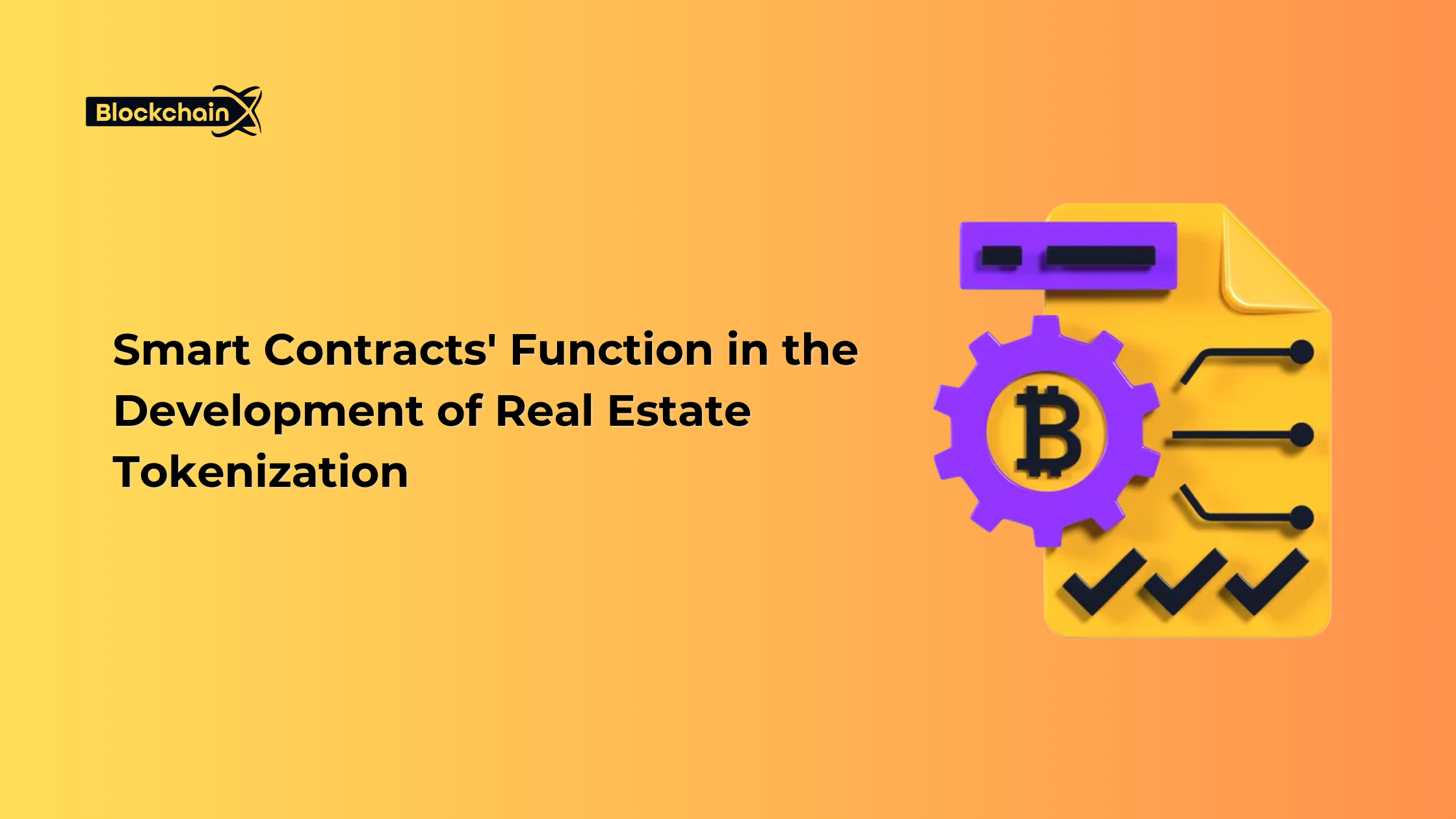Smart Contracts' Function in the Development of Real Estate Tokenization

Strong 8k brings an ultra-HD IPTV experience to your living room and your pocket.
Recently, real estate tokenization has emerged as an incipient trend that integrates blockchain technology with the real estate market, thereby changing the face of property buying, selling, and management. One of the most revolutionary technologies that will make this possible is smart contracts. These contracts are self-executing ones written in code. They can potentially simplify, automate, and secure property transactions, thereby being important aspects of real-estate tokenization.
This blog post looks into the nitty-gritty involved with the application and development of smart contracts with regard to real estate tokenization. It will delineate their role with regard to increased efficiency, transparency, and accessibility in property investments, which challenges developers will face when utilizing smart contracts.
Smart Contracts
Smart contracts need to be understood first before going into their specific roles regarding tokenizing real estates.
A smart contract is an application that is deployed and executed by a blockchain to provide a way for enforcing the agreements made between two or more parties to each other without going through intermediary processes. Self-executing once the previously defined conditions have been executed, there is no further human involvement regarding the contract.
For example, in a property transaction, a smart contract will automatically transfer ownership of a tokenized real estate asset from the seller to the buyer, provided that payment has been made. This codified contract would execute its terms, providing a very transparent, secure, and smooth process.
The Role of Smart Contracts in Real Estate Tokenization
1. Automating Property Transactions
Most conventional real estate negotiations use various intermediaries such as brokers, notaries, lawyers, and banks, who do the paperwork formalities and process validations and essentially make the transfer of funds by adding costs and sometimes delays. By automating key aspects of transaction processing, smart contracts eliminate intermediation.
In tokenization, the stages of a transaction can be predefined in smart contracts to automatically carry out the following actions:
Token transfer: once the payment is completed, the smart contract can transfer the ownership of the tokenized real estate property (which is now a digital token) into the wallet of the buyer.
Escrow Management: the contract keeps the funds in escrow until the conditions required for transfer of title of a property have been fulfilled, including the satisfaction of its-his-her condition verification.
Verification and compliance: Smart contracts can be created to ensure that both buyer and seller comply with all regulatory and legal requirements shortly before the conclusion of the transaction, such as Know Your Customer (KYC) or Anti-Money Laundering (AML) requirements.
By automating these processes, smart contracts dramatically cut transaction time as much as possible and reduce the scope for human error, all while saving a lot on transaction costs.
2. Ensuring Transparency and Security
Transparency and security are core issues in real estate transactions. The fact is that traditional real estate dealings are opaque and there is an ever-present risk of fraud. By their nature, smart contracts are transparent and immutably reliable.
Transparency: A smart contract once deployed on the blockchain provides the terms of the contract observation by all parties involved. The whole transaction history may be known and audited by everyone who has access to the blockchain. Thus, the possible hidden information or fraud in the transactions is non-existing.
Safety: Good records keep everyone safe; blockchain technology is the basic infrastructure and inherent safety of smart contracts. Cryptographic techniques are used for protecting data from tampering or hacking. Since smart contracts are automated and executed by code, the mistakes and biases that a human might make can be minimized, thus ensuring a great deal of accuracy and reliability of transactions.
It introduces enhanced transparency and security for parties who might otherwise have doubts about dealing with property transactions, particularly in cross-border deals where laws and regulations may differ.
Check out more our : Real estate tokenization development
3. Fractional Ownership and Token Distribution
Divide into small and tradable units; that is the best advantage of real estate tokenization. Tokenization enables a high-valued property (for example, a commercial building or a luxury private residence) to be broken down into fractional shares, represented on a digital token, where each token represents a part of ownership of the entire property.
Smart contracts handle the issuing, transferring, and governing of these tokens. The construction of smart contracts can be done by developers, for example:
Issuing Tokens: Once a property is tokenized, smart contracts can manage the process of creating digital tokens that represent fractional ownership shares in the property.
Transferring Tokens: When a buyer purchases a tokenized share, the smart contract automatically transfers to the buyer ownership of the token from the seller, representing a change of ownership.
Distributing Profits: In cases where property generates a revenue stream through rent or appreciation, smart contracts can auto-distribute earnings among token holders based on their ownership percentage.
This decentralized nature will allow more people to invest in real estate while lowering the barriers to entry for small investors, thus democratizing access to high-value assets.
4. Enforcing Legal and Regulatory Compliance
The real estate transactions are made under the aegis of various regulations such as local zoning laws, tax requirements, and securities regulations, and smart contracts may facilitate the seamless enforcement of compliance checks on all stakeholders involved in the real estate transaction. Smart contracts can include codes that:
For example, smart contracts might encompass code that:
Verifies the buyer's identity and passing the buyer through any regulatory requirements (i.e. KYC/AML checks) with some unbeatable, time-saving benefits.
Automatically updating local authorities or registries with changes of ownership.
Capital gains tax or other applicable taxes are withheld during the trades.
Notifies diversions or non-conformance from legal standards.
These currently integrated compliance characteristics would minimize the chances of entering into disputes even after tokenization of real estate investments, making it seem safer and more amusing to institutional investors and regulatory bodies.
5. Property Management and Governance
This can include the buying and selling of tokenized property, and smart contracts may involve real estate asset management and governance. Since the property is tokenized, there will always be maintenance, management of tenants, operational expenses, etc. Smart contracts can automate these processes, thus enhancing the experience of the property manager and token holders.
Maintenance and Upkeep: Smart contracts can automatically pay for services such as cleaning or repair and maintenance, according to previously defined accords.
Governance: Owners of the tokens can vote regarding important decisions affecting the property, for instance, upgrading the amenities or changing a property management company. Automatic vote tallying and implementing decisions based on token holder input will occur with the smart contract.
The automation of property management tasks increases the efficiency of operations and makes transparent as well as fair treatment to all stakeholders involved Here are some tokenization niche legal ones.
Conclusion
Smart contracts are the keystone of the tokenization of real estate. They will affect appropriate automation around property transactions, fractional ownership and legal compliance in the most effective, secure, and transparent manner. This will create a property investment framework by eliminating intermediaries, bringing down costs, and generally increasing the security of investments, an entirely new era of democratization in access to high-value assets, and global investment scenarios in property.
However transforming these smart contracts into real estate tokenization includes quite a number of hurdles. Projects or developers need to resolve complex legal issues, scalability challenges, risks lying in security, and the utmost hurdle of user adoption before the same can be enjoyed fully in the fray of tokenized real estate.
It is widely believed that, with the pace at which blockchain technology advances, smart contracts are going to redefine the property investment field, rendering investments in property more accessible, efficient, and transparent as never before.
Note: IndiBlogHub features both user-submitted and editorial content. We do not verify third-party contributions. Read our Disclaimer and Privacy Policyfor details.


